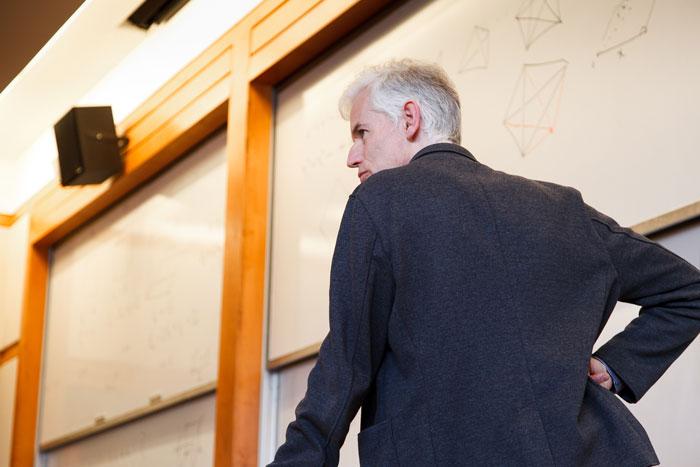Complicated but Accessible

In Tome Hall, Timothy Gowers, this year's Joseph Priestley Award winner, discussed theories of the mathematics of dimension with a packed room of students and faculty members. Photo by Carl Socolow '77.
Priestley Award winner Sir Timothy Gowers brings heady topics and an undeniable love of math to campus
by Tony Moore
Often compared to the Nobel Prize, which doesn’t have a mathematics category, the Fields Medal is bestowed by the International Mathematical Union for “outstanding discoveries in mathematics." The twist is that the Fields is only handed out once every four years, and only mathematicians under the age of 40 are eligible.
One of those few recipients is also the 63rd recipient of Dickinson’s Joseph Priestley Award, Sir Timothy Gowers, who spent the last few days on campus with students, professors and the wider Dickinson community.
“Tim Gowers is the ideal Priestley Award winner,” said Professor of Mathematics David Richeson, who has followed Gowers’ career and work closely over the years. “He is one of the world’s greatest living mathematicians, but he is also a great spokesperson and advocate for mathematics and for the profession.”
Since 1956, the Priestley Award has been presented in memory of Joseph Priestley, discoverer of oxygen, to a distinguished scientist whose work has served to benefit humanity. While on campus, Gowers—who has made important contributions in such fields as functional analysis, combinatorics, number theory and computer science—gave two presentations. “What Is Dimension?” was a lunchtime talk for students and faculty in Tome Hall, while “Can Computers Be Mathematicians?” was held in the Stern Great Room and drew attendees from all corners of the community.
Both events were standing room only (and even the Great Room overflow area was packed), and Richeson credits Gowers’ popularity, in part, to his approach to the world of mathematics: It’s an important community and one that will embrace anyone who’s interested.
“He has written extensively about mathematics and its culture,” Richeson said, noting that one of Gowers’ goals is to take on big publishers, such as Elsevier, a monolithic textbook and journal publisher. “He wants mathematics to be a big tent under which everyone is welcome, and at the heart of his work on reforming the scholarly publishing industry is the desire to make mathematics more accessible.”
Despite covering topics such as Koch snowflakes, Lebesgue covering dimensions and Brownian motion in his Tome “chat,” as he called it, it became apparent that Gowers’ pedagogic style and affable demeanor go a long way toward both making his students at ease and making complex concepts digestible.
“An area where Gowers excels is talking to general audiences, as he did last night in Stern, and explaining what mathematicians do and how we do it,” said Associate Professor of Mathematics Dick Forrester, noting that Gowers extended the approach to illustrate the theme of the talk. “He sees that breakdown of the process mathematicians use as the first step in programming a computer to not only solve complex mathematical problems but to actually prove important theorems.”
It’s unlikely that anyone at the events hopes that computers one day will be able to replace someone like Gowers at the head of a classroom or behind a podium.
Learn more
- Joseph Priestley Award
- Department of Mathematics
- Department of Computer Science
- Fields Medal
- Latest News
Published March 27, 2015